Here are some events that happened on August 26th. It could be an event or a person that died or was born on that day
1723 Died: Antonie van Leeuwenhoek, Dutch microscopist and biologist (b. 1632)
Antonie Philips van Leeuwenhoek (24 October 1632 – 26 August 1723) was a Dutch businessman and scientist in the Golden Age of Dutch science and technology. A largely self-taught man in science, he is commonly known as "the Father of Microbiology", and one of the first microscopists and microbiologists. Van Leeuwenhoek is best known for his pioneering work in microscopy and for his contributions toward the establishment of microbiology as a scientific discipline.
Raised in Delft, Dutch Republic, van Leeuwenhoek worked as a draper in his youth and founded his own shop in 1654. He became well recognized in municipal politics and developed an interest in lensmaking. In the 1670s, he started to explore microbial life with his microscope. This was one of the notable achievements of the Golden Age of Dutch exploration and discovery (c. 1590s–1720s).
Using single-lensed microscopes of his own design, van Leeuwenhoek was the first to experiment with microbes, which he originally referred to as dierkens, diertgens or diertjes (Dutch for "small animals" [translated into English as animalcules, from Latin animalculum = "tiny animal"]). Through his experiments, he was the first to relatively determine their size. Most of the "animalcules" are now referred to as unicellular organisms, although he observed multicellular organisms in pond water. He was also the first to document microscopic observations of muscle fibers, bacteria, spermatozoa, red blood cells, crystals in gouty tophi, and blood flow in capillaries. Although van Leeuwenhoek did not write any books, his discoveries came to light through correspondence with the Royal Society, which published his letters.
Dutch stamp depicting van Leeuwenhoek
1740 Born: Joseph-Michel Montgolfier, French inventor, invented the hot air balloon (d. 1810)
Joseph-Michel Montgolfier (26 August 1740 – 26 June 1810) and Jacques-Étienne Montgolfier (6 January 1745 – 2 August 1799) were paper manufacturers from Annonay, in Ardèche, France best known as inventors of the Montgolfière-style hot air balloon, globe aérostatique. They launched the first piloted ascent, carrying Jacques-Étienne. Joseph-Michel also invented the self-acting hydraulic ram (1796), Jacques-Étienne founded the first paper-making vocational school and the brothers invented a process to manufacture transparent paper.
Stamps from Austria and Berlin commemorating the montgolfière
Stamps from Austria and Berlin commemorating the montgolfière
1743 Born: Antoine Lavoisier, French chemist and biologist (d. 1794)
Antoine-Laurent de Lavoisier (26 August 1743 – 8 May 1794), also Antoine Lavoisier after the French Revolution, was a French nobleman and chemist who was central to the 18th-century chemical revolution and who had a large influence on both the history of chemistry and the history of biology. He is widely considered in popular literature as the "father of modern chemistry".
It is generally accepted that Lavoisier's great accomplishments in chemistry stem largely from his changing the science from a qualitative to a quantitative one. Lavoisier is most noted for his discovery of the role oxygen plays in combustion. He recognized and named oxygen (1778) and hydrogen (1783), and opposed the phlogiston theory. Lavoisier helped construct the metric system, wrote the first extensive list of elements, and helped to reform chemical nomenclature. He predicted the existence of silicon (1787) and was also the first to establish that sulfur was an element (1777) rather than a compound. He discovered that, although matter may change its form or shape, its mass always remains the same.
Lavoisier was a powerful member of a number of aristocratic councils, and an administrator of the Ferme générale. The Ferme générale was one of the most hated components of the Ancien Régime because of the profits it took at the expense of the state, the secrecy of the terms of its contracts, and the violence of its armed agents. All of these political and economic activities enabled him to fund his scientific research. At the height of the French Revolution, he was charged with tax fraud and selling adulterated tobacco, and was guillotined.
French stamp depicting Antoine Lavoisier
It is generally accepted that Lavoisier's great accomplishments in chemistry stem largely from his changing the science from a qualitative to a quantitative one. Lavoisier is most noted for his discovery of the role oxygen plays in combustion. He recognized and named oxygen (1778) and hydrogen (1783), and opposed the phlogiston theory. Lavoisier helped construct the metric system, wrote the first extensive list of elements, and helped to reform chemical nomenclature. He predicted the existence of silicon (1787) and was also the first to establish that sulfur was an element (1777) rather than a compound. He discovered that, although matter may change its form or shape, its mass always remains the same.
Lavoisier was a powerful member of a number of aristocratic councils, and an administrator of the Ferme générale. The Ferme générale was one of the most hated components of the Ancien Régime because of the profits it took at the expense of the state, the secrecy of the terms of its contracts, and the violence of its armed agents. All of these political and economic activities enabled him to fund his scientific research. At the height of the French Revolution, he was charged with tax fraud and selling adulterated tobacco, and was guillotined.
French stamp depicting Antoine Lavoisier
Charles Augustus Lindbergh (February 4, 1902 – August 26, 1974) was an American aviator, military officer, author, inventor, and activist. At the age of 25 in 1927, he went from obscurity as a U.S. Air Mail pilot to instantaneous world fame by winning the Orteig Prize for making a nonstop flight from New York City to Paris. Lindbergh covered the 33 1⁄2-hour, 3,600-statute-mile (5,800 km) flight alone in a purpose-built, single-engine Ryan monoplane, the Spirit of St. Louis. While the first non-stop transatlantic flight had been made 8 years earlier, this was the first solo transatlantic flight, the first transatlantic flight between two major city hubs, and the longest transatlantic flight by almost 2,000 miles. Thus it is widely considered a turning point in world history for the development and advancement of aviation.
Lindbergh was an officer in the U.S. Army Air Corps Reserve, and he received the United States' highest military decoration, the Medal of Honor, for his transatlantic flight. His achievement spurred interest in both commercial aviation and air mail, which revolutionized the aviation industry, and he devoted much time and effort to promoting such activity.
In March 1932, Lindbergh's infant son, Charles Jr., was kidnapped and murdered in what the American media called the "Crime of the Century". The case prompted the United States Congress to establish kidnapping as a federal crime if the kidnapper crosses state lines with a victim. By late 1935, the hysteria surrounding the case had driven the Lindbergh family into exile in Europe, from which they returned in 1939.
In the years before the United States entered World War II, his non-interventionist stance and statements about Jews led some to suspect he was a Nazi sympathizer, although Lindbergh never publicly stated support for Nazi Germany. He opposed not only the intervention of the United States but also the provision of aid to the United Kingdom. He supported the anti-war America First Committee and resigned his commission in the U.S. Army Air Forces in April 1941 after President Franklin Roosevelt publicly rebuked him for his views. In September 1941, Lindbergh gave a significant address, titled "Speech on Neutrality", outlining his views and arguments against greater American involvement in the war.
Lindbergh did ultimately express public support for the U.S. war effort after the Japanese attack on Pearl Harbor and the subsequent United States declaration of war upon Germany. He flew 50 missions in the Pacific Theater of World War II as a civilian consultant, but did not take up arms as Roosevelt refused to reinstate his Air Corps colonel's commission. In his later years, Lindbergh became a prolific author, international explorer, inventor, and environmentalist, eventually dying of lymphoma in 1974, at age 72.
US stamp and FDC issued to commemorate Lindbergh's transatlantic flight
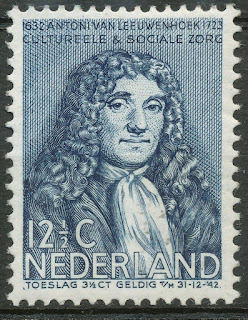

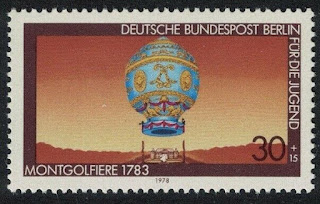
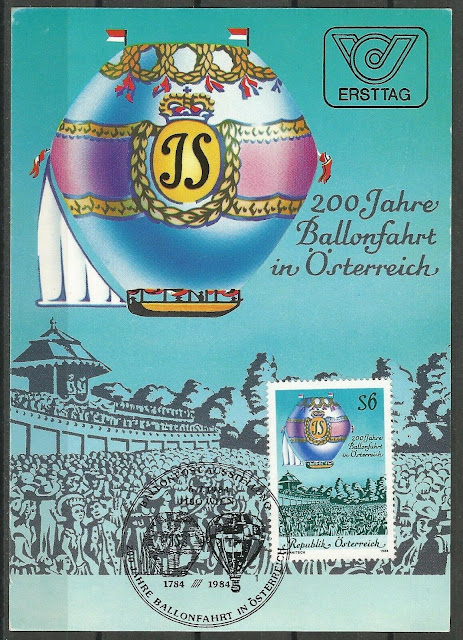
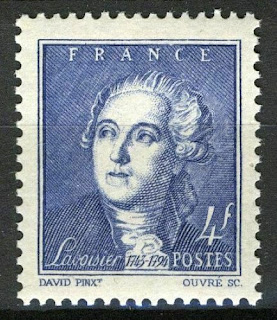
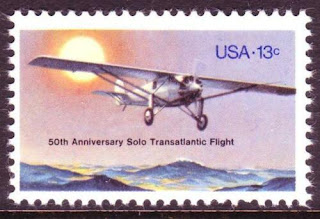
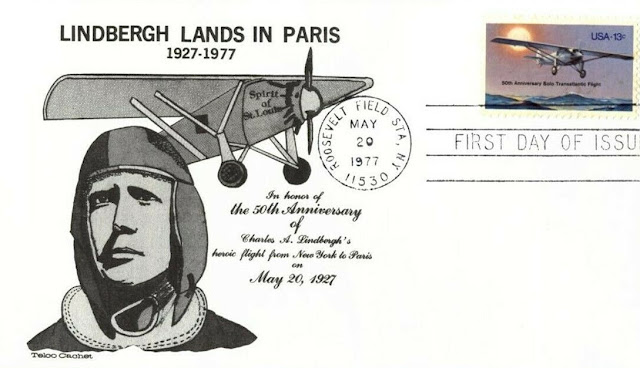
No comments:
Post a Comment